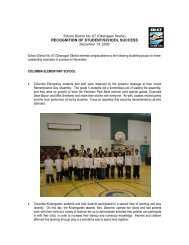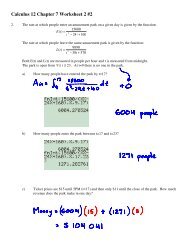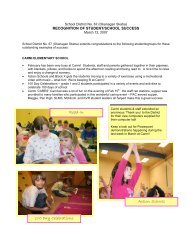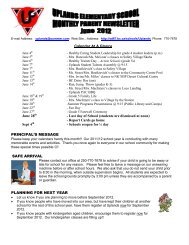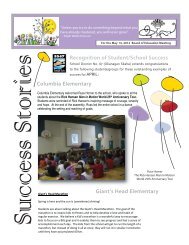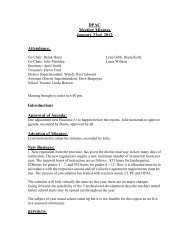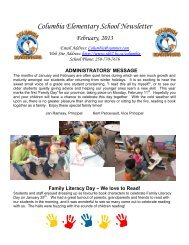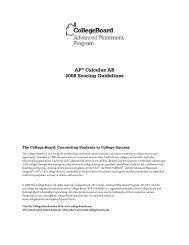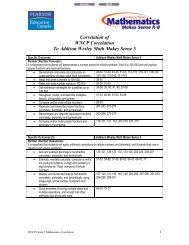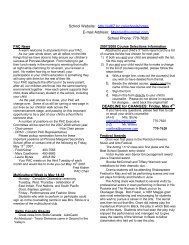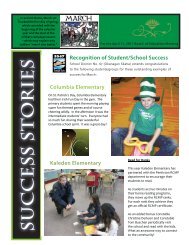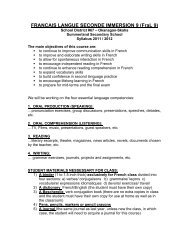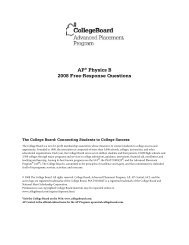Literature Circles Jobs - School District 67
Literature Circles Jobs - School District 67
Literature Circles Jobs - School District 67
Create successful ePaper yourself
Turn your PDF publications into a flip-book with our unique Google optimized e-Paper software.
<strong>Literature</strong> <strong>Circles</strong> <strong>Jobs</strong><br />
Literary Luminary:<br />
Your job is to locate a few special sections of the text that your group<br />
would like to hear read aloud. The idea is to help people remember some<br />
interesting, powerful, funny, puzzling, or important sections of the text.<br />
You decide which passages or paragraphs are worth hearing, and then jot<br />
plans for how they should be shared. You can read the passages aloud<br />
yourself, ask someone else to read them, or have people read silently and<br />
discuss.<br />
Possible reasons for picking a passage to be shared:<br />
Important<br />
Surprising<br />
Funny<br />
Confusing<br />
Informative<br />
Controversial<br />
Wellwritten<br />
Thoughtprovoking<br />
Discussion Director:<br />
Your job is to develop a list of questions that your group might want to discuss about this<br />
part of the book. Don’t worry about the small details. Your task is to help people<br />
talk over the BIG ideas in the reading and share their reactions. Usually the best<br />
discussion questions come form your own thoughts, feelings, and concerns as you<br />
read, which you can list during or after your reading. Questions should be specific<br />
to the novel.<br />
Sample questions:<br />
How did you feel while reading this part of the book?<br />
Did anything in this section surprise you?<br />
What are one or two of the most important ideas?<br />
Predict some things that may happen next?<br />
Connector:<br />
Your job is to find connections between the book your group is<br />
reading and the world outside. This means connecting the reading to your<br />
own life, to happenings at school or in the community, to similar events at<br />
other times and places, to people or problems that you are reminded of.<br />
You might also see connections between this book and other writings on<br />
the same topic or by the same author. There are no right or wrong answers<br />
here, what the reading connects you with is worth sharing.
Investigator:<br />
Your job is to dig up some background information on any topic related to your book.<br />
This might include:<br />
· The geography, weather, culture, or history of the book’s setting<br />
· Information about the author, her/his life, and other works.<br />
· Information about the time period portrayed in the book<br />
· Picture, objects, or materials that illustrate elements of the book<br />
· The history and derivation of words or names used in the book<br />
· Music that reflects the book or the time<br />
Ways of gathering information:<br />
• The introduction, preface, or “about the author” section of the book (only<br />
one person can use this)<br />
• Library books and magazines<br />
• The Internet<br />
• Interviews with people who know the topic<br />
• Other novels, nonfiction, or textbooks you’re read<br />
Illustrator:<br />
Your job is to draw some kind of picture related to the reading. It can be<br />
a sketch, cartoon diagram, flow chart or stickfigure scene. You can draw a<br />
picture of something that is discussed specifically in your book or something that<br />
the reading reminded you of. When it is time to show your picture, try this<br />
technique: show it to everyone without explaining. Then have them speculate<br />
what your picture means.<br />
Presentation Plan: When the discussion Director invites your participation, you may show your<br />
picture without comment to the others in the group. One at a time, they get to speculate what<br />
your picture means, to connect the drawing to their own ideas about the reading. After everyone<br />
has had a say, you get the last word: tell them what your picture means, where it came from, or<br />
what it represents to you.<br />
Alternate jobs:<br />
Word Master:<br />
Your job is to be on the lookout for a few especially important words in today’s reading.<br />
If you find words that are puzzling or unfamiliar, jot them down. Then later find their definition<br />
and make a plan to present it to your circle. You may also run across words that used in unusual<br />
ways or that are repeated a lot. Mark them too, and help members discuss the words you have<br />
chosen.<br />
Summarizer:<br />
Your job is to prepare a brief summary of today’s reading. The other members of your<br />
group will be counting on you to give a quick statement that conveys the gist, the key points, the<br />
main highlights, the essence of today’s reading assignment. If there are several main ideas or<br />
events to remember, list them in the order in which the occurred.




